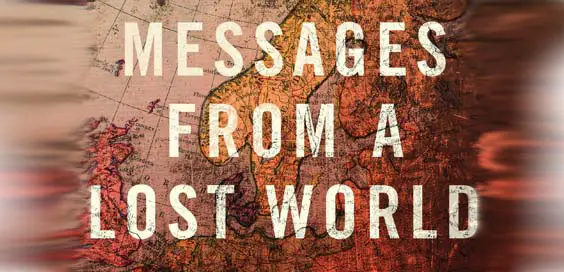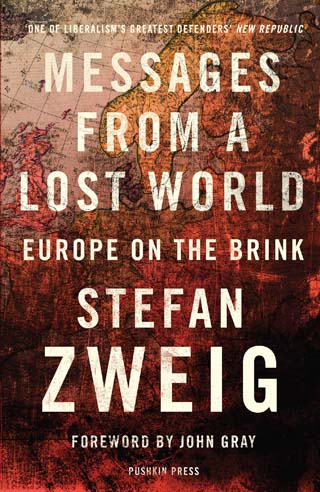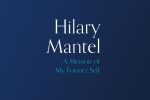Messages From a Lost World: Europe on the Brink by Stefan Zweig – Book Review

by Barney Bardsley
Never has a book seemed more timely, more eloquent and persuasive, than this small collection of essays by Austrian novelist and man of letters, Stefan Zweig. Written and published between 1914 and 1941, they present a compelling and heartfelt argument for a united Europe. They are also a kind of love letter to literature and to the arts in general. Zweig is an elegant, masterful writer. Although his words come from a century ago, they carry a contemporary resonance that is startling and salutary.
We need his voice at this moment, and it was perspicacious of Pushkin Press to bring his collection to public attention, right here, right now.
The book is unusual in one regard. It includes a lengthy introduction from Zweig’s English translator, Will Stone. This is commendable in itself, since translators are usually invisible midwives – their work apparent on every page, but hardly ever acknowledged as literature in its own right. But the introduction is useful here, too, since Stone gives a lucid insight into the workings of Zweig’s character and mind, as well as his work.
“A persuasive and elegant precision”
 Stefan Zweig has sometimes been criticised for his lack of outright condemnation of the Nazis, until quite late on in the day – although it is abundantly clear in all his writing, which side of history he is on. Without condoning Zweig’s political reticence, Stone offers a nuanced appraisial, both the writer’s flaws and strengths, emphasising, above all, Zweig’s deep belief in “a European spirit… a practicable spiritual integration, a higher guild of amiable coalition.”
Stefan Zweig has sometimes been criticised for his lack of outright condemnation of the Nazis, until quite late on in the day – although it is abundantly clear in all his writing, which side of history he is on. Without condoning Zweig’s political reticence, Stone offers a nuanced appraisial, both the writer’s flaws and strengths, emphasising, above all, Zweig’s deep belief in “a European spirit… a practicable spiritual integration, a higher guild of amiable coalition.”
Zweig himself did not survive the Nazi onslaught. Once his books began to be burned in Germany, he fled for England, America, Brazil, before finally, in 1942, committing suicide with his wife Lotte, in complete despair at the collapse of civilisation across an entire continent. He was, to his dying day, a true European.
All the essays in this collection are written with a persuasive and elegant precision. The clarion call for unity has never sounded so sorrowful: his message so utterly relevant to today. ‘The Sleepless World’, written in 1914, on the eve of World War One, is especially haunting, as he writes of a collective anxiety stalking the West: “There is less sleep in the world today; longer are the nights and longer the days.”
Poignant and comforting, too, is his belief, expressed in the same essay, that all will be well again, despite the overwhelming conflict that approaches. “Even though mass destruction appears omnipresent today, monstrously spreading across a terrorised world, it is in the end nothing compared to the more powerful energy of life, which, after each interval of anguish, instils a period of recovery to ensure existence becomes stronger and still more beautiful.”
“Standing together against the barbarism of division”
This is the measure of the man. He takes us by the hand and walks us through some of the most difficult years in the world’s history, revealing both his anguish and his deep belief in humanity. In ‘The Unification of Europe’ he writes: “The European idea is not a primary emotion like patriotism or ethnicity; it is not born of a primitive instinct, but rather of perception; it is not the product of spontaneous fervour, but the slow-ripened fruit of a more elevated way of thinking.” The antidote to Brexit and the world of Donald Trump.
There are mini-excursions on the way, as we weave our way through this delightful collection: a meditation on the artist’s work, the process of creativity; plus a love letter to his home city of Vienna, birthplace of such glorious music, theatre and art. But Zweig’s main theme remains persistent and true: that of standing together, nation to nation, in culture and in solidarity, against the barbarism of division, xenophobia and hatred.
Here, too, the resonances with today’s world leap off the page. In ‘The Historiography of Tomorrow’, written in 1939, Zweig argues that: “presently our world finds itself in an extraordinary situation, in the midst of a deep moral crisis… the whole world lives in fear that a massive eruption of some kind will occur at any moment.” Sound familiar?
It is writers like Stefan Zweig who act as watchdogs of civilisation itself, and who, with their cultured spirit and love of humanity, guide the rest of us forward: beacons of light in a dark, dark night.
‘Messages From A Lost World: Europe on the Brink’ by Stefan Zweig, translated by Will Stone is published by Pushkin Press £9.99









